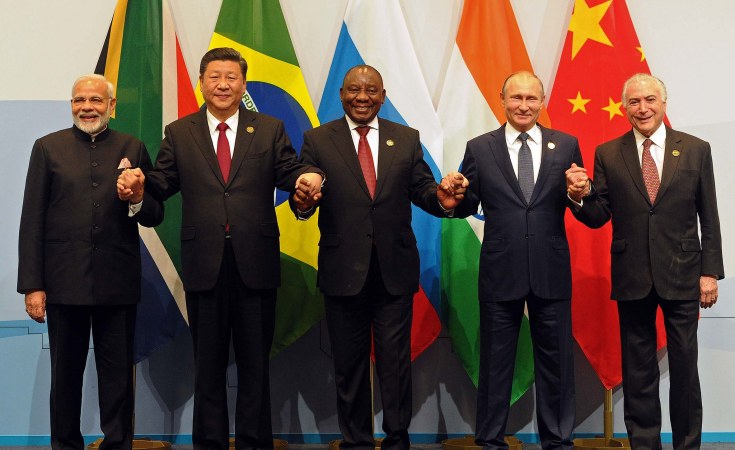South Africa's inclusion in the BRICS grouping of nations - whose 10th summit it will host from July 25 to 27 - has long been questioned, since by most indicators – economic, geographic, and demographic – it is dwarfed by its four partner nations: Brazil, Russia, India and China.
However, South Africa punches above its weight: it has contributed significantly to the BRICS agenda so far and will do so again this year. Pretoria's commitment to inclusive and sustainable development – internationally, in Africa, and domestically – will drive the BRICS agenda for this year and mark its contribution.
From the outset, the BRICS nations have coalesced around common international challenges from the perspective of a developing country: dealing with the fallout from global financial crises, reforming global governance institutions such as the World Bank and the International Monetary Fund, maintaining the primacy of the multilateral trading system, and promoting sustainable development.
Post-apartheid South Africa has been a key participant in global dialogues addressing these issues. Pretoria has played a convening role in various World Trade Organization groupings and has participated in the Heiligendamm process of the G8, a dialogue between the G8 nations and emerging economies, and later in the G20.
In 2018, South Africa has been elected to a third term as non-permanent member of the United Nations Security Council, elected to chair the International Monetary Fund's International Monetary and Financial Committee, and is co-chairing the International Labour Organization's Global Commission on the Future of Work. Through its engagements in these fora, it advances the priorities of the BRICS and other developing countries.
Within BRICS, South Africa has consistently advocated not only its own interests, but also through its diplomacy of ubuntu [link downloads PDF] those of all African countries. When South Africa first chaired BRICS in 2013, it initiated the bloc's first regional outreach in favour of extending the benefits of its participation to the rest of the continent. This year, South Africa will again foreground African development priorities when it hosts nine African countries, as representative of their respective regional economic communities, at a BRICS-Africa outreach dialogue on the summit fringe.
Importantly, this year's BRICS-Africa outreach will allow these nine African countries to draw BRICS' attention to the recently launched African Continental Free Trade Agreement (AfCFTA). Once complete, the AfCFTA will create a continental market of more than 1.2 billion people and a gross domestic product of $2.5 trillion, [downloads PDF] with significant commercial appeal for the BRICS. It is also a core component of the continent's industrialisation strategy, which aims to promote trade investment and the creation of regional value chains.
China, India and Brazil have dedicated bilateral cooperation fora with Africa and Russia will soon launch its own. It would serve the BRICS and Africa well to align their commercial and development agendas.
South Africa's efforts in promoting continental infrastructure development were rewarded by the BRICS' decision to establish the first regional center of the New Development Bank (NDB) – which holds significant potential for infrastructure financing by reducing the time and cost of facilitating infrastructure financing – on the African continent. South Africa should now lobby those BRICS members reluctant to broaden the membership of the bank to invite other countries.
At the same time, Pretoria should highlight increasing and unsustainable sovereign debt levels in African countries to its BRICS counterparts. Alongside South Africa, China and India have become significant infrastructure financers on the continent [downloads PDF]. Advocating for more concessional finance and transparency in loans will enhance the sustainability of development finance.
As the 2018 summit begins, South Africa has sought to address some of its domestic challenges through the BRICS prism: the country is facing an unemployment rate of 27.7 percent and technology and automatisation's impact on labour remains a critical concern. The 2018 BRICS Summit is hosted under the banner 'BRICS in Africa: Collaboration for Inclusive Growth and Shared Prosperity in the 4th Industrial Revolution'. The BRICS countries are increasingly at the forefront of driving these technological advances and the first in line to face its impacts.
This year South Africa will also prioritise greater gender equality and the empowerment of women in BRICS by systematically weaving related themes throughout the more than 100 sectoral meetings it chairs. These efforts will reach their zenith in South Africa's proposal to establish a BRICS Gender and Women's Forum. While South Africa has made great strides in promoting gender equality, ranking among the top 20 countries globally, its BRICS counterparts lag [downloads PDF]. Leading by example, Pretoria looks to shape a more inclusive world – both within BRICS and globally.
Part of this inclusive world is allowing meaningful participation from a broad range of stakeholders. When it first hosted the BRICS countries in 2013, South Africa established the BRICS Think Tanks Council, which brought together BRICS researchers and academics to exchange ideas and to generate evidence-based policy recommendations. And while South Africans coordinating BRICS engagements have consistently solicited inputs from civil society groups on issues for consideration at summit level, not all BRICS countries have a common approach towards civil society engagement. South Africa will again this year look to formalise the participation of civil society organisations as part of the BRICS' existing people-to-people exchanges in areas of culture, sport, education, film and youth.
South Africa's small size, compared to the other BRICS countries, has not prevented it from meaningful engagement within the grouping. As it gears up to host the summit, it will again look to push forward the agenda on issues it deems vital for itself and the African continent, BRICS and other developing countries.
Cyril Prinsloo is a researcher in the Economic Diplomacy Programme at the South African Institute of International Affairs (SAIIA). His key research portfolios include Africa's interaction with strategic global partners, global governance and infrastructure financing in African countries. He is a fellow of the Global Governance Futures 2030 programme. This is slightly adapted by AllAfrica from the original article, published by Global Public Policy Institute.


